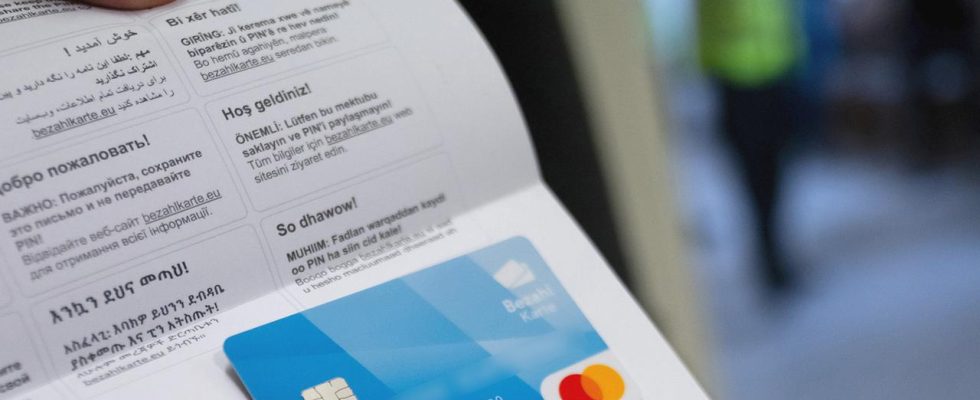The compromise is in place: The government parties have agreed on a legal basis to legally protect the payment card for asylum seekers and refugees. The federal states in particular had put pressure on in the past few weeks.
After weeks of dispute, the traffic light factions have agreed on a draft for a nationwide legal basis for the introduction of a payment card for refugees and asylum seekers. This will “implement the wishes of the states,” said the government factions of the SPD, Greens and FDP in a joint statement.
“Payment cards were already possible before, but we have now created a common, legally secure framework,” said deputy SPD parliamentary group leader Dagmar Schmidt. She explained that the desired legal framework ensures that all necessary needs can be secured locally – with the card or as a cash payment.
Countries stood up Legal certainty
The Green politician Andreas Audretsch emphasized that things such as pocket money for school trips, the bus ticket for the traineeship or electricity or internet connection would have to be guaranteed when the payment card was introduced. This is now guaranteed. The Greens had repeatedly expressed concern that a drastic cash restriction could mean that refugees would hardly be able to pay at kiosks or in second-hand shops.
The FDP parliamentary group deputy Lukas Köhler now explained that the agreements decided by the Prime Minister’s Conference and the Federal Cabinet would be implemented “without any changes to the content”.
In November, the federal and state governments agreed on a payment card for refugees that was as uniform as possible across the country. 14 federal states are planning a common system. Bavaria and Mecklenburg-Western Pomerania want their own payment cards. The card should essentially function like a normal cash card, but at the same time exclude transfers abroad and limit the withdrawal of cash.
Greens still saw a need for clarification
On March 1st, the Federal Cabinet voted for a legislative proposal from Social Affairs Minister Hubertus Heil to secure the planned payment card with a federal law. The Greens then reported a need for clarification on details.
According to the draft that has now been presented, it is planned that the payment card will be explicitly included as an option in the Asylum Seekers Benefits Act – in addition to the existing options for cash or benefits in kind. It represents a suitable means of preventing money payments to smugglers, for example.
The federal states can therefore decide whether to introduce the card and how to specifically structure its use. This takes “individual needs and local circumstances” into account. “The regulation also enables the benefit authorities, when exercising their discretion, to take into account circumstances due to which the use of a payment card does not appear appropriate in individual cases,” says the draft.
The wording aid also states that the service authorities can decide for themselves how much cash cardholders can withdraw within a certain period of time.
Presentation in the Bundestag from next week?
However, some points remain open that need to be finally clarified. This includes the question of whether an exception to the payment card is made for groups of people such as employees, trainees or students. The Bundestag plenary session will meet again in Berlin next week. The payment card could then be on Parliament’s agenda.
FDP parliamentary group vice-president Köhler said that the states now have the opportunity to make their contribution to a “new real migration policy by eliminating one of the main pull factors for irregular immigration”.
Criticism from lawyers and Pro Asyl
At Pro Asyl this argument is not considered valid. With the traffic light plans, “populism has once again triumphed over factual arguments” in refugee policy, the organization explained. “In practice, refugees in many places will be even more marginalized and restricted in even the smallest everyday decisions.” Migrants “wouldn’t let the payment card stop them” from fleeing persecution or war.
Criticism of the payment card also came from the German Lawyers’ Association (DAV), which warned of a “variety of practical problems” and a considerable additional effort for administration and the judiciary.
The German Association of Cities was only partially satisfied. Managing director Helmut Dedy said it was good that there was now an agreement. However, there is still a lack of “clear regulation from the federal government as to whether and what upper limit should apply to cash payouts”. The federal states would now have to determine this, ideally as uniformly as possible.
Lea Eichhorn, ARD Berlin, tagesschau, April 5, 2024 6:25 p.m

